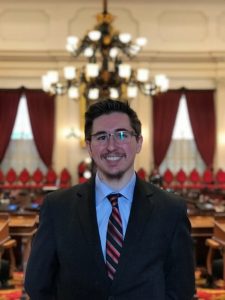Legislative Intern Spotlight: Jeremy Little

Name: Jeremy Little
College: Saint Michael’s College
Field of Study: Political Science Major, Economics Minor, Spanish Minor
Anticipated Graduation: May 2023
Hometown: Georgia, VT
“In this internship, I’m excited to get to know how everything works at the State House. So far, I’ve been lucky to be introduced to many great people who spend their time at the State House, both legislators, lobbyists, and many others. Some of the skills I am developing through this internship include an innate understanding of the legislative process, issues facing Vermonters, and of how the various bills proposed will affect businesses and individuals.
After graduating, I plan to stay in Vermont and work as a summer canvasser. Following this, I hope to find employment in the fall at a job either directly or indirectly involved in politics within Vermont. At some point, I plan to return to college for a graduate degree in public or environmental policy.
I look forward to the opportunity to connect. Please reach out if you would like to speak further. This internship is a great opportunity for me, and I welcome the opportunity to deepen my connection with Vermont and with its inner mechanisms.”
Contact Information:
Email – 19jslsbhs@gmail.com
The 2023 Legislative Monitoring Collaborative is made possible by the support of the National Life Group:


